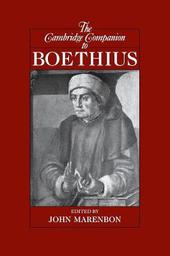
|
The Cambridge Companion to Boethius
Paperback / softback
Main Details
| Title |
The Cambridge Companion to Boethius
|
| Authors and Contributors |
Edited by John Marenbon
|
| Series | Cambridge Companions to Philosophy |
|---|
| Physical Properties |
| Format:Paperback / softback | | Pages:372 | | Dimensions(mm): Height 228,Width 152 |
|
| Category/Genre | Western philosophy - Ancient to c 500 |
|---|
| ISBN/Barcode |
9780521694254
|
| Classifications | Dewey:180.937 |
|---|
| Audience | | Professional & Vocational | | Tertiary Education (US: College) | |
|---|
| Illustrations |
Worked examples or Exercises
|
|
Publishing Details |
| Publisher |
Cambridge University Press
|
| Imprint |
Cambridge University Press
|
| Publication Date |
14 May 2009 |
| Publication Country |
United Kingdom
|
Description
Boethius (c.480-c.525/6), though a Christian, worked in the tradition of the Neoplatonic schools, with their strong interest in Aristotelian logic and Platonic metaphysics. He is best known for his Consolation of Philosophy, which he wrote in prison awaiting execution. His works also include a long series of logical translations, commentaries and monographs and some short but densely-argued theological treatises, all of which were enormously influential on medieval thought. But Boethius was more than a writer who passed on important ancient ideas to the Middle Ages. The essays here by leading specialists, which cover all the main aspects of his writing and its influence, show that he was a distinctive thinker, whose arguments repay careful analysis and who used his literary talents in conjunction with his philosophical abilities to present a complex view of the world.
Author Biography
John Marenbon is a Senior Research Fellow at Trinity College, Cambridge. His publications include The Philosophy of Peter Abelard (1997, 1999) and Boethius (2003).
Reviews"...the quality of all of the chapters in this magnificent volume is very high, a fact that will hopefully encourage historians of philosophy to broaden their horizons, as it were, and to 'read Boethius whole' (2), as Marenbon puts it." Philosophy in Review, Peter Eardley, University of Guelph
|